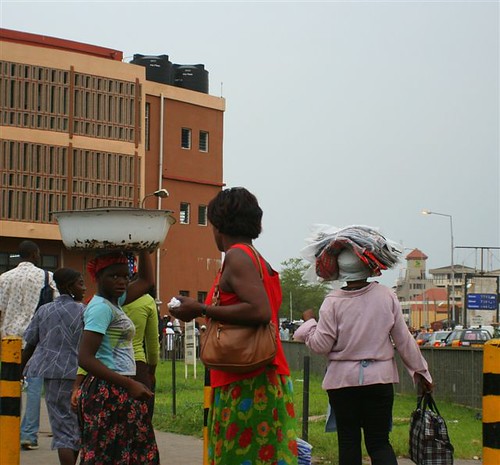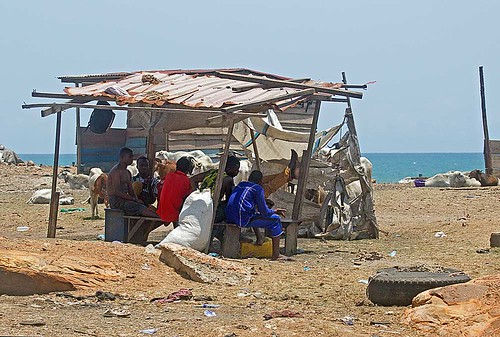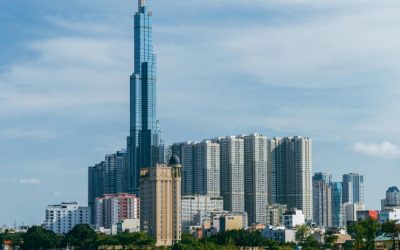Geography and Location
Accra, the vibrant capital of Ghana, is strategically situated along the Gulf of Guinea in West Africa. Its geographical location offers a blend of coastal beauty and urban development, making it a key economic and cultural hub in the region. Understanding Accra’s geography and location helps to appreciate its significance and influence within Ghana and beyond.
Regional Context
Accra, the capital city of Ghana, is situated along the Gulf of Guinea on the southern coast of West Africa. Its strategic coastal location provides it with a natural port that has historically facilitated trade and commerce in the region. The city lies approximately at latitude 5.56°N and longitude 0.19°W, positioning it as a key gateway between Ghana and the international community. Surrounded by diverse geographical features such as plains, swamps, and coastal beaches, Accra’s landscape influences its climatic conditions and urban development.
Regionally, Accra is a central hub within the Greater Accra Region, which is the smallest but most densely populated region in Ghana. It is part of the Gulf of Guinea’s extensive coastal zone that connects several West African countries through maritime routes. The city’s location places it within a vibrant economic and cultural corridor, serving as the political, commercial, and social heart of Ghana. Its proximity to other major cities like Tema and Kumasi further enhances its significance in the regional network of urban centers in West Africa.
Topographical Features
Accra, the capital city of Ghana, is situated along the Atlantic coast in the southeastern part of the country. The city lies on a flat, wide plain that is bordered by the Gulf of Guinea to the south, offering it a strategic maritime location. Topographically, Accra features a mix of coastal beaches, gently rolling hills, and low-lying plains, providing a diverse landscape that supports both urban development and natural vegetation. The city’s proximity to the Atlantic Ocean influences its climate and weather patterns, making it a key economic and administrative hub in Ghana.
Climate and Weather Patterns
Accra, the capital city of Ghana, is situated along the southeastern coast of West Africa, bordering the Gulf of Guinea. Its strategic coastal location has historically made it a vital hub for trade and commerce in the region.
The climate in Accra is classified as tropical and is characterized by a warm, humid environment year-round. Temperatures typically range between 24°C (75°F) and 31°C (88°F), with hot, dry seasons prevailing from November to March and a rainy season from April to October, influenced by the West African Monsoon.
Weather patterns in Accra are heavily shaped by the seasonal shifts in the Atlantic Ocean’s influence and the West African Monsoon system. The city experiences consistent humidity and a relatively stable climate, with the most rainfall occurring during the rainy season, contributing to lush vegetation and agriculture in surrounding areas.
History and Development
Accra, the vibrant capital of Ghana, has a rich history and dynamic development that reflects the country’s cultural and economic growth. From its origins as a small trading settlement to a bustling metropolis, Accra has experienced significant transformations over the centuries. The city’s development has been shaped by historical events, colonial influences, and modern advancements, making it a key center for politics, commerce, and culture in West Africa.
Founding and Early History
Accra, the capital city of Ghana, has a rich history and significant development journey that dates back centuries. Its founding and early history are deeply intertwined with the region’s trading and cultural exchanges, shaping it into the vibrant metropolis it is today.
- Accra’s origins can be traced to the 15th century, when it was a small settlement populated by the Ga people, who are the indigenous inhabitants of the coastal area.
- During the 16th century, the area became a prominent center for trade, especially in gold, kola nuts, and salt, attracting traders from different parts of West Africa and beyond.
- European contact began in the 15th century, with the Portuguese establishing a trading post in the region, followed by the Dutch, Danish, and British, each influencing its development.
- The establishment of the British Gold Coast Colony in 1874 marked a significant turning point, leading to increased urbanization and infrastructural development in Accra.
- Accra officially became the capital of the British colony in 1902, replacing Cape Coast and catalyzing its growth into an administrative and economic hub.
- Throughout the early 20th century, Accra experienced rapid growth with the building of roads, administrative buildings, and educational institutions, laying the foundation for modern Ghana.
Colonial Era and Independence
Accra, the capital city of Ghana, has a rich history that reflects its development from a small fishing settlement to a major urban center. During the colonial era, Accra was an important hub for trade and administration under British rule, which influenced its architecture, institutions, and infrastructure. The city grew significantly as it became the administrative capital of the Gold Coast colony, playing a central role in economic and political activities. Ghana’s fight for independence gained momentum in Accra, where key movements and leaders emerged, culminating in the country’s liberation from colonial rule in 1957. Today, Accra stands as a vibrant metropolis that honors its historical legacy while embracing modern growth and development.
Urban Growth and Modern Development
Accra, the capital city of Ghana, has experienced significant historical development and urban growth over the centuries. Originally a small fishing village, it evolved into a major trade center during the trans-Atlantic slave trade era, serving as a hub for commerce and cultural exchange. As Ghana gained independence in 1957, Accra’s importance increased, prompting rapid urbanization and infrastructural development.
Throughout the 20th century, Accra expanded rapidly due to population growth, rural-urban migration, and economic development. This growth led to the expansion of residential neighborhoods, commercial centers, and transportation networks. The city faced challenges such as congestion, inadequate housing, and environmental degradation, which spurred modern development efforts to improve urban planning and public services.
In recent decades, Accra has seen substantial modernization with the construction of skyscrapers, shopping malls, and improved transportation corridors. The government and private sectors have invested in urban infrastructure, aiming to transform Accra into a global city. Efforts to promote sustainable development and improve living standards continue to shape the city’s ongoing growth, making Accra a vibrant metropolis blending rich history with modern ambitions.
Districts and Neighborhoods
Accra, the vibrant capital city of Ghana, is a tapestry of diverse districts and neighborhoods, each offering unique cultural experiences and distinct atmospheres. From bustling commercial hubs to tranquil residential areas, exploring these districts provides insight into the city’s rich history and dynamic urban landscape. Understanding the different neighborhoods of Accra is essential for visitors and residents alike to navigate and appreciate the city’s vibrant spirit.
Central Business District
Accra, the capital city of Ghana, is divided into various districts and neighborhoods, each with its unique character and significance. These areas serve different purposes, from residential to commercial and administrative functions. The Central Business District (CBD) of Accra is the heart of the city’s economic activities. It is characterized by tall office buildings, banks, government offices, and bustling markets, making it a vital hub for commerce and urban life. Neighborhoods such as Osu, Labone, and East Legon offer a mix of vibrant nightlife, upscale residences, and shopping centers, contributing to the city’s diverse urban landscape. Overall, the districts and neighborhoods of Accra reflect the city’s growth, culture, and dynamic development trajectory.
Residencial Neighborhoods
Accra, the capital city of Ghana, is divided into various districts and neighborhoods that contribute to its vibrant urban landscape. These districts each have unique characteristics, from bustling commercial areas to quiet residential zones. Residencial neighborhoods in Accra are primarily known for their diverse housing options, including modern apartments, traditional houses, and upscale estates. These neighborhoods often feature local markets, schools, and recreational facilities, making them attractive places for residents to live. Popular residential areas such as Osu, Labone, and East Legon offer a mix of cultural experiences and amenities, reflecting the city’s dynamic growth and development. Overall, the districts and neighborhoods of Accra exemplify the city’s rich cultural tapestry and evolving urban environment.”
Emerging Urban Areas
Accra, the capital city of Ghana, is characterized by diverse districts and neighborhoods, each contributing to the city’s vibrant urban landscape. These areas range from bustling commercial centers to tranquil residential communities, reflecting the city’s growth and cultural richness. Emerging urban areas in Accra are rapidly developing, often marked by modern infrastructure, new housing projects, and increased amenities, attracting both local residents and expatriates. These neighborhoods symbolize the city’s ongoing expansion and adaptation to contemporary urban needs, fostering economic growth and cultural exchange.
Economy and Industry
Accra, the vibrant capital of Ghana, serves as a significant hub for the nation’s economy and industry. This bustling city boasts a diverse economic landscape, encompassing manufacturing, services, trade, and technology sectors. As a center of commerce and innovation, Accra plays a vital role in shaping Ghana’s economic growth and development, attracting investments and fostering entrepreneurial opportunities across the region.
Commercial Hub
Accra, the capital city of Ghana, serves as a vital economic and industrial center in West Africa. It boasts a thriving commercial hub that attracts both local and international businesses, fostering robust trade and commerce activities. The city’s diverse economy includes sectors such as manufacturing, construction, services, and technology, which contribute significantly to its growth and development. Accra’s strategic location and port facilities enhance its role as a key gateway for goods and commodities entering and leaving Ghana, establishing it as a pivotal player in regional commerce. Continuous investments in infrastructure and industry have further strengthened Accra’s position as an economic powerhouse within the country and the West African region. This dynamic environment creates numerous employment opportunities and supports the overall economic stability of Ghana.

Trade and Markets
Accra, the capital city of Ghana, serves as the economic and industrial hub of the country, playing a pivotal role in shaping national trade and market activities. The city hosts a diverse range of industries, including manufacturing, export services, and technology sectors, which contribute significantly to Ghana’s overall economic growth. Marketplaces like Makola Market exemplify vibrant local commerce, facilitating the exchange of goods such as textiles, foodstuffs, and crafts. Additionally, Accra benefits from regional and international trade through its ports and transportation networks, enabling the city to act as a gateway for Ghana’s export-driven economy. The dynamic nature of Accra’s economy reflects the city’s strategic importance in fostering trade relations and attracting investments, thereby underpinning Ghana’s aspirations for sustainable development and economic prosperity.
Industrial Zones
Accra, the capital city of Ghana, has experienced significant growth in its economy and industrial sectors over recent years. The development of industrial zones has played a crucial role in fostering economic expansion, attracting foreign investment, and creating jobs for the local population.
Industrial zones in Accra are designated areas that promote manufacturing, processing, and other industrial activities. These zones provide infrastructure, streamlined regulations, and incentives to encourage businesses to set up operations and contribute to the city’s economic vitality.
- Strategic location near ports and transportation hubs facilitates trade and distribution.
- Proximity to skilled labor markets supports various industrial activities.
- Government initiatives aim to boost industrial growth through special economic zones and incentives.
- Key sectors include manufacturing, textiles, electronics, and food processing.
- Efforts are underway to upgrade infrastructure and provide sustainable energy solutions within industrial zones.
Cultural and Historical Landmarks
Accra, the vibrant capital of Ghana, is rich in cultural and historical landmarks that reflect its diverse heritage. From UNESCO World Heritage sites to ancient forts and bustling markets, the city offers a fascinating glimpse into Ghana’s past and its dynamic present. Exploring these landmarks provides visitors with a deeper understanding of the nation’s history, traditions, and cultural identity.
Independence Square
Independence Square, also known as Black Star Square, is a prominent cultural and historical landmark located in Accra, Ghana. It serves as a symbol of Ghana’s struggle for independence and national pride. The square features a vast open space with impressive colonial-era architecture and iconic monuments, including the Black Star Gate and the Independence Arch, which commemorate Ghana’s independence from British colonial rule in 1957. Visitors often explore the site during national celebrations and public events, making it a vital part of Ghana’s cultural heritage. The historical significance and striking design of Independence Square make it a must-see destination for those interested in Ghana’s history and identity.
Kwame Nkrumah Mausoleum
The Kwame Nkrumah Mausoleum is a significant cultural and historical landmark located in Accra, Ghana. It serves as the final resting place of Dr. Kwame Nkrumah, Ghana’s first President and a prominent figure in Africa’s independence movement. The mausoleum is an iconic symbol of Ghana’s history and independence, attracting many visitors who wish to pay tribute to the leader who fought for freedom and unity. Visitors to the site can explore the beautifully maintained gardens, statues, and the mausoleum itself, which embodies Ghanaian architectural styles and historical reverence. It stands as a testament to Ghana’s struggle for independence and the legacy of Nkrumah’s leadership, making it an essential destination for those interested in the country’s cultural and political history.
National Museum of Ghana
The National Museum of Ghana, located in Accra, is a significant cultural and historical landmark that offers visitors a profound insight into the country’s rich heritage. It showcases a diverse collection of artifacts, including traditional costumes, sculptures, and historical relics that depict Ghana’s long-standing history and cultural evolution. The museum serves as an educational hub where both locals and tourists can learn about Ghanaian traditions, arts, and history through its well-curated exhibits. Being one of the prominent landmarks in Accra, it plays a vital role in preserving the nation’s identity and promoting cultural awareness. Visitors to Accra often include the National Museum in their itinerary to gain a deeper understanding of Ghana’s historical roots and cultural diversity.

Transportation and Infrastructure
Transportation and infrastructure are vital components of Accra, Ghana’s vibrant capital city. They play a crucial role in supporting economic growth, improving connectivity, and enhancing the quality of life for residents and visitors alike. As Accra continues to develop, efforts to modernize and expand its infrastructure are essential to meet the demands of a growing population and ensure sustainable development.
Road Networks and Highways
Accra, the capital city of Ghana, boasts a growing transportation and infrastructure network that plays a vital role in the city’s development. The road networks in Accra are extensive, connecting various neighborhoods and facilitating the movement of people and goods effectively. Major highways such as the N1 and N2 serve as primary arteries, linking Accra to other parts of Ghana and neighboring countries. These highways are crucial for trade, commerce, and daily commutes. Over the years, there have been significant investments in upgrading and expanding the road infrastructure to reduce congestion and improve safety. Additionally, the city is also working on integrating modern transportation systems, including bus rapid transit (BRT) and ongoing proposals for light rail systems, to enhance mobility and reduce reliance on individual vehicles. The continuous development of road networks and highways in Accra is essential for supporting its economic growth and addressing urban mobility challenges.
Public Transit Systems
Accra, Ghana, boasts a developing transportation and infrastructure system that is essential for its urban growth and economic development. The city primarily relies on a mix of public transportation options, including tro-tros, taxis, and a limited bus network, to move residents and visitors around efficiently. Despite these options, traffic congestion remains a significant challenge due to rapid population growth and urbanization.
Efforts are underway to improve Accra’s public transit system, including the recent introduction of the Metro Mass Transit buses, aimed at providing affordable and reliable transportation. Additionally, there are ongoing projects to upgrade roads and expand transit routes to better connect different parts of the city. The government also plans to develop more modern transport infrastructure, such as light rail and dedicated bus lanes, to reduce congestion and improve mobility for its citizens.
Port of Tema
The Port of Tema is a key transportation and infrastructure hub in Accra, Ghana, serving as the country’s primary gateway for international trade and cargo movement. Its strategic location along the Gulf of Guinea enhances Ghana’s connectivity to global markets, supporting economic growth and development.
- Established in 1962, the Port of Tema has expanded significantly to accommodate increasing maritime traffic.
- The port features modern facilities, including container terminals, bulk cargo areas, and container freight stations, ensuring efficient handling of diverse goods.
- It is equipped with advanced logistics and transportation infrastructure, such as extensive road networks and rail links, facilitating smooth movement of goods to and from Accra and across Ghana.
- The port also plays a vital role in employment creation and boosting the local economy by supporting trade and industrial activities in Accra and surrounding regions.
- Ongoing upgrades and expansion projects aim to increase capacity, improve operational efficiency, and enhance compliance with international standards.
Education and Universities
Accra, the vibrant capital city of Ghana, is home to a growing educational landscape that offers numerous opportunities for students. The city hosts several renowned universities and colleges, making it an important hub for higher education in West Africa. With a strong focus on academic excellence and research, Accra continues to attract both local and international students eager to expand their knowledge and skills.
Public Schools and Institutions
Accra, the capital city of Ghana, is home to a wide range of educational institutions that serve both local and international students. The city boasts a well-developed education system, including public schools, universities, and specialized institutions dedicated to various fields of study, making it a center for academic excellence in West Africa.
- Public Schools: Accra’s public schools are managed by the Ghana Education Service and provide free basic education. These schools are accessible to the majority of local residents and follow the national curriculum designed to promote literacy and essential skills.
- Universities: Accra hosts several prominent universities, including the University of Ghana, which is one of the oldest and most prestigious institutions in the country. Other notable universities include Accra Technical University, Ghana Institute of Management and Public Administration (GIMPA), and the Central University.
- Specialized Institutions: The city also features numerous vocational and technical colleges, teacher training colleges, and research centers that support the development of skilled professionals and innovative research.
Overall, Accra’s educational landscape plays a vital role in Ghana’s development, offering diverse opportunities for students to acquire quality education and contribute to the nation’s growth.
University of Ghana
Accra, the vibrant capital city of Ghana, is home to the prestigious University of Ghana, one of the oldest and most renowned institutions of higher learning in West Africa. Established in 1948, the university offers a wide range of undergraduate and postgraduate programs across various fields including arts, sciences, business, law, and health sciences. The university’s main campus, located in Legon, is a hub of academic excellence and cultural diversity, attracting students from across Ghana and beyond. It plays a significant role in shaping the educational landscape of the region and contributes to research, innovation, and socio-economic development in Ghana. The University of Ghana is committed to fostering an environment of academic integrity, critical thinking, and community engagement, preparing students to become valuable contributors to society.
Research and Innovation Centers
Accra, the capital city of Ghana, is a vibrant hub for education, research, and innovation. It hosts numerous prominent universities such as the University of Ghana, Central University, and Ashesi University, which attract students from across the continent and beyond. These institutions play a vital role in shaping skilled professionals and fostering advanced research in various fields including technology, health, and social sciences.
Research centers and innovation hubs in Accra are pivotal in promoting technological development and addressing local challenges. The Ghana Atomic Energy Commission and the Noguchi Memorial Institute for Medical Research are notable institutions contributing to scientific and medical research. Additionally, numerous startup incubators and innovation centers like iDEA Ghana and Impact Hub Accra support entrepreneurial initiatives and technological advancement, positioning Accra as a growing center for education and innovation in West Africa.
Tourism and Attractions
Accra, the vibrant capital city of Ghana, is a popular destination for travelers seeking a rich blend of cultural heritage, modern attractions, and warm hospitality. With its bustling markets, historic sites, beautiful beaches, and lively entertainment scenes, Accra offers visitors an unforgettable experience. Whether exploring historic landmarks or enjoying the lively nightlife, tourists are sure to find numerous attractions that showcase the city’s unique character and charm.
Beaches and Waterfronts
Accra, the vibrant capital of Ghana, is renowned for its diverse tourism and attractions that draw visitors from around the world. The city offers a mix of cultural heritage, modern entertainment, and natural beauty, making it a compelling destination for travelers. Notable sites include the Kwame Nkrumah Mausoleum, the National Museum, and the vibrant Makola Market, which showcases Ghanaian crafts and daily life.
Beaches and waterfronts play a significant role in Accra’s appeal, providing serene escapes and lively social scenes. Labadi Beach, also known as La Pleasure Beach, is famous for its lively atmosphere, music, and horseback riding. Nearby beaches like Kokrobite and Osu Castle Beach offer tranquil spots for relaxation and enjoying the ocean views. The waterfront areas are perfect for strolls, picnics, and experiencing the warm Atlantic breeze, making Accra a city where culture and coastal beauty blend seamlessly.
Festivals and Events
Accra, the vibrant capital city of Ghana, is a popular destination for tourists seeking a mix of cultural heritage, modern attractions, and lively festivals. Visitors can explore historical sites, enjoy local cuisine, and experience the city’s dynamic events that celebrate Ghanaian traditions and history.
- National Museum of Ghana: Showcasing Ghana’s rich history, culture, and art through various exhibits and artifacts.
- Arts Center: A bustling marketplace where visitors can find handcrafted souvenirs, textiles, and artwork created by local artisans.
- Labadi Beach: A popular coastal spot for relaxing, swimming, and enjoying live music and dance performances during weekends.
- Kwame Nkrumah Mausoleum: A historical site honoring Ghana’s first President, offering insight into the country’s independence movement.
- La Palm Casino: For entertainment enthusiasts looking to try their luck in a luxurious setting.
- Homowo Festival: Celebrated in August, this festival commemorates the harvest and features traditional drumming, dancing, and a shared feast.
- Chale Wote Street Art Festival: An annual event in August showcasing street art, performances, music, and dance, transforming Accra into a vibrant open-air art gallery.
- Fetu Afahye Festival: Held in the nearby town of Cape Coast but influential to Accra, celebrating ancestral heritage with processions and drumming.
- Christmas and New Year Celebrations: Accra bursts into festive cheer with fireworks, concerts, and street parties during the holiday season.
Cultural Sites
Accra, the vibrant capital of Ghana, is a city rich in tourism and cultural attractions that draw visitors from around the world. Visitors can explore historical sites such as the W.E.B. Du Bois Center, which honors the renowned civil rights activist and scholar, and the National Museum of Ghana, home to a diverse collection of artifacts showcasing Ghanaian history and culture. The city also offers beautiful beaches like Labadi Beach, where tourists can relax and enjoy local music and cuisine.
Cultural sites in Accra include the artists’ enclaves of Artists Alliance Gallery and the vibrant Makola Market, providing unique shopping experiences and a taste of local life. The city’s vibrant nightlife, traditional festivals, and bustling markets make it a fascinating destination for travelers seeking cultural immersion. With its blend of history, arts, and lively urban scenes, Accra offers a compelling mix of tourism and cultural experiences that reflect Ghana’s rich heritage.
Challenges and Urban Development
Urban development in Accra, Ghana, faces numerous challenges as the city rapidly expands. Rapid population growth, inadequate infrastructure, and environmental concerns are among the key issues that hinder sustainable development. Addressing these challenges is essential to create a resilient and livable urban environment for residents and future generations.
Traffic Congestion
Traffic congestion is a significant challenge facing urban development in Accra, Ghana. As the city continues to grow rapidly, the increase in vehicles on the road has led to frequent gridlocks, impacting daily commutes and overall productivity. This congestion is fueled by inadequate infrastructure, limited public transportation options, and poor road planning, which struggle to keep pace with the expanding population. Additionally, unplanned urban sprawl and insufficient traffic management exacerbate the problem, creating a cycle that hinders sustainable development. Addressing these issues requires comprehensive urban planning, investment in mass transit systems, and policies aimed at controlling vehicle growth. Sustainable solutions are essential to improve mobility, reduce pollution, and promote economic growth in Accra’s increasingly congested urban environment.
Housing and Urban Sprawl
Accra, Ghana faces numerous challenges related to urban development, housing, and urban sprawl that impact its growth and sustainability. Rapid population growth and economic development have intensified the pressure on the city’s infrastructure, leading to significant urban planning issues. Uncontrolled sprawl has resulted in haphazard housing developments, inadequate public services, and increased traffic congestion, all of which affect residents’ quality of life.
- Limited affordable housing options contribute to informal settlements and slum conditions.
- Rapid urban sprawl stretches existing infrastructure and resources thin, complicating service provision.
- Traffic congestion due to insufficient public transportation and poorly planned road networks causes delays and pollution.
- Environmental degradation is exacerbated by unregulated construction and expansion into green spaces.
- Urban planning efforts face challenges from political, economic, and social factors that hinder sustainable development initiatives.
Environmental Concerns
Accra, Ghana faces numerous challenges related to urban development and environmental concerns as it continues to grow rapidly. The influx of people into the city has led to increased pressure on infrastructure, resulting in congestion, inadequate transportation systems, and strain on essential services. Rapid urbanization often outpaces planning, causing unplanned settlements and slum development that lack proper sanitation and housing. Environmental issues such as pollution from vehicles, industrial activities, and waste disposal have become significant problems, contributing to air and water pollution. Additionally, deforestation and loss of green spaces threaten biodiversity and reduce the city’s natural resilience against climate change. Addressing these challenges requires sustainable planning and investment in eco-friendly infrastructure to ensure a healthier and more resilient future for Accra.





0 Comments